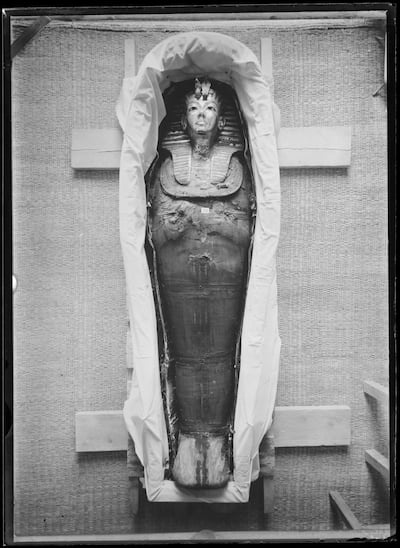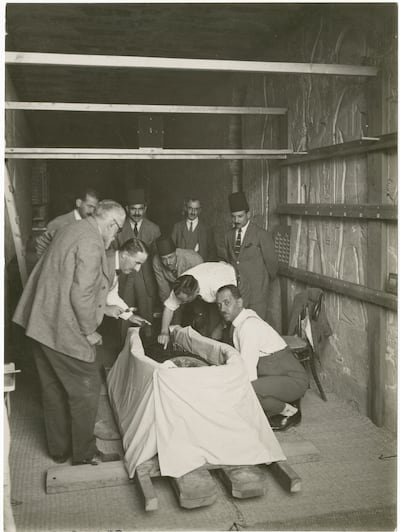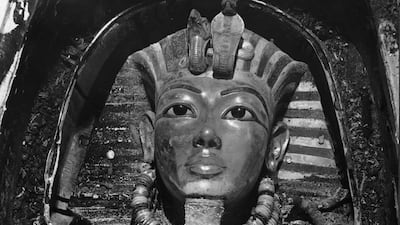With a surgeon’s precision, the team began their examination of the corpse by delicately removing crumbling bandages. What they found were among the greatest archaeological treasures of all time.
Exactly a century ago, the mummified body of the boy pharaoh Tutankhamen was unwrapped for the first time. It was three years after the discovery of his tomb in Egypt’s Valley of the Kings by Howard Carter and Lord Carnarvon.
The list of “wonderful things” first seen by Carter on opening the tomb in November 1922 would continue with the autopsy in 1925. Adorning the body were rings, amulets and a collar shaped like a vulture, all of solid gold.
Now, the drama of that occasion is available for all to see. Carter’s meticulous records, including notes, photographs and drawings, have been digitalised and put online this week to mark the centenary of the unwrapping.
Stepping back in time
The documents and photographs, including the original magic-lantern glass slides, held by the Griffith Institute at the University of Oxford in England as the Tutankhamun Spatial Archive, is currently in beta format, with the public invited to comment and make suggestions.
The institute specialises in Egyptology and first received the collection after Carter’s death in 1939 when it was donated by his niece.
“What we are talking about is about 20,000 records that were produced during the 10-year process that it took the team to excavate the tomb,” said Daniela Rosenow, an Egyptologist and manager of the institute.
“Since the 1960s we have been trying to publish the material in the classical book form and by the 1990s it was clear this way it would take us 200 years to publish everything.”
Work on creating the website in its present form began this year thanks to a donation from a fund financed by the Oxford University Press.
The institute has big plans for the future, including a 3-D model of Tutankhamen’s tomb and an Arabic version of the site, but is depending on donations to make this possible.
“I think it is just a much more engaging and connected way to explore the data,” said Ms Rosenow. “My hope is that it could go beyond that. It's also a window in how archaeology was practised 100 years ago.
“I’m sure there will be a lot of historians who will research questions like the politics of knowledge and empire. It's also useful for conservators, of course, especially for our Egyptian colleagues who work to preserve the objects.”
Revisiting ancient history
Carter’s own excitement can be felt in the diary entry he wrote on November 11, 1925. “Today has been a great day in the history of archaeology, I might also say in the history of archaeological discovery, and a day of days for one who after years of work, excavating, conserving & recording, has longed to see in fact what previously has only been conjectural.”
Over the next nine days, more than 100 artefacts were discovered under the nearly 3,500-year-old body. They included a gold apron, two hawk collars, a vulture-head diadem, a gold dagger and rings for fingers and toes, all designed for the pharaoh to use in the afterlife.
Carter was astonished at the craftsmanship, writing “it would tax our goldsmiths of today to surpass such refinement as is found in these royal ornaments”.
Almost of equal value for historians are series of 18 “autopsy drawings” made by Carter as the work progressed, showing the exact placement of the objects on Tutankhamen’s body, which is drawn muscular and youthful, rather than the withered corpse which was discovered.
Much had changed since the opening of the tomb in 1922. At the instance of the Egyptian government, all the contents would remain in Cairo rather than be sent overseas, as had happened in past times. These included the magnificent funerary mask, made of gold and decorated with semi-precious stones, which had been uncovered with the exposure of the inner coffin in October 1925.
Lord Carnarvon, sponsor of the original expedition, died aged just 56, the result of an infection from a mosquito bite, which led to stories that the tomb was cursed.
Grand Egyptian Museum - in pictures
The unwrapping of the mummy was conducted under the authority of the Egyptian Antiquities Service, along with several representatives of the Egyptian government.
Dr Saleh Hamdi, former director of Cairo Medical School, and Prof Douglas Derry, a British anatomist and anthropologist, were on hand to examine the body.
Alfred Lucas, a British chemist, was recruited as a conservationist, his first job to apply a thin layer of paraffin wax to stabilise the bandages, which had crumbed to powder. Prof Derry was then able to removed them, layer by layer,
As the treasures were exposed, they were photographed in place by Harry Burton, a British snapper, then assigned a number by Carter.
The contents of the tomb would not be fully examined and conserved until 1933, by which time they had been placed on view at the Museum of Egyptian Antiquities in Tahrir Square, Cairo.
Today, the treasures of Tutankhamen are among the jewels of the collection that can be seen at the new Grand Egyptian Museum, finally opened in full this month.
Heather, the Totality
Matthew Weiner,
Canongate
Our family matters legal consultant
Name: Hassan Mohsen Elhais
Position: legal consultant with Al Rowaad Advocates and Legal Consultants.
COMPANY PROFILE
Name: HyperSpace
Started: 2020
Founders: Alexander Heller, Rama Allen and Desi Gonzalez
Based: Dubai, UAE
Sector: Entertainment
Number of staff: 210
Investment raised: $75 million from investors including Galaxy Interactive, Riyadh Season, Sega Ventures and Apis Venture Partners
White hydrogen: Naturally occurring hydrogen
Chromite: Hard, metallic mineral containing iron oxide and chromium oxide
Ultramafic rocks: Dark-coloured rocks rich in magnesium or iron with very low silica content
Ophiolite: A section of the earth’s crust, which is oceanic in nature that has since been uplifted and exposed on land
Olivine: A commonly occurring magnesium iron silicate mineral that derives its name for its olive-green yellow-green colour
VEZEETA PROFILE
Date started: 2012
Founder: Amir Barsoum
Based: Dubai, UAE
Sector: HealthTech / MedTech
Size: 300 employees
Funding: $22.6 million (as of September 2018)
Investors: Technology Development Fund, Silicon Badia, Beco Capital, Vostok New Ventures, Endeavour Catalyst, Crescent Enterprises’ CE-Ventures, Saudi Technology Ventures and IFC
Founders: Abdulmajeed Alsukhan, Turki Bin Zarah and Abdulmohsen Albabtain.
Based: Riyadh
Offices: UAE, Vietnam and Germany
Founded: September, 2020
Number of employees: 70
Sector: FinTech, online payment solutions
Funding to date: $116m in two funding rounds
Investors: Checkout.com, Impact46, Vision Ventures, Wealth Well, Seedra, Khwarizmi, Hala Ventures, Nama Ventures and family offices
MEDIEVIL%20(1998)
%3Cp%3E%3Cstrong%3EDeveloper%3A%3C%2Fstrong%3E%20SCE%20Studio%20Cambridge%3Cbr%3E%3Cstrong%3EPublisher%3A%3C%2Fstrong%3E%20Sony%20Computer%20Entertainment%3Cbr%3E%3Cstrong%3EConsole%3A%3C%2Fstrong%3E%20PlayStation%2C%20PlayStation%204%20and%205%3Cbr%3E%3Cstrong%3ERating%3A%3C%2Fstrong%3E%203.5%2F5%3C%2Fp%3E%0A
The%20specs
%3Cp%3E%3Cstrong%3EEngine%3A%20%3C%2Fstrong%3E3.6-litre%2C%20V6%0D%3Cbr%3E%3Cstrong%3ETransmission%3A%20%3C%2Fstrong%3Eeight-speed%20auto%0D%3Cbr%3E%3Cstrong%3EPower%3A%20%3C%2Fstrong%3E285hp%0D%3Cbr%3E%3Cstrong%3ETorque%3A%20%3C%2Fstrong%3E353Nm%0D%3Cbr%3E%3Cstrong%3EPrice%3A%20%3C%2Fstrong%3EDh159%2C900%0D%3Cbr%3E%3Cstrong%3EOn%20sale%3A%20%3C%2Fstrong%3Enow%3C%2Fp%3E%0A
More coverage from the Future Forum
Mica
Director: Ismael Ferroukhi
Stars: Zakaria Inan, Sabrina Ouazani
3 stars
Four-day collections of TOH
Day Indian Rs (Dh)
Thursday 500.75 million (25.23m)
Friday 280.25m (14.12m)
Saturday 220.75m (11.21m)
Sunday 170.25m (8.58m)
Total 1.19bn (59.15m)
(Figures in millions, approximate)
The specs: 2017 Dodge Ram 1500 Laramie Longhorn
Price, base / as tested: Dhxxx
Engine: 5.7L V8
Transmission: Eight-speed automatic
Power: 395hp @ 5,600rpm
Torque: 556Nm @ 3,950rpm
Fuel economy, combined: 12.7L / 100km
10 tips for entry-level job seekers
- Have an up-to-date, professional LinkedIn profile. If you don’t have a LinkedIn account, set one up today. Avoid poor-quality profile pictures with distracting backgrounds. Include a professional summary and begin to grow your network.
- Keep track of the job trends in your sector through the news. Apply for job alerts at your dream organisations and the types of jobs you want – LinkedIn uses AI to share similar relevant jobs based on your selections.
- Double check that you’ve highlighted relevant skills on your resume and LinkedIn profile.
- For most entry-level jobs, your resume will first be filtered by an applicant tracking system for keywords. Look closely at the description of the job you are applying for and mirror the language as much as possible (while being honest and accurate about your skills and experience).
- Keep your CV professional and in a simple format – make sure you tailor your cover letter and application to the company and role.
- Go online and look for details on job specifications for your target position. Make a list of skills required and set yourself some learning goals to tick off all the necessary skills one by one.
- Don’t be afraid to reach outside your immediate friends and family to other acquaintances and let them know you are looking for new opportunities.
- Make sure you’ve set your LinkedIn profile to signal that you are “open to opportunities”. Also be sure to use LinkedIn to search for people who are still actively hiring by searching for those that have the headline “I’m hiring” or “We’re hiring” in their profile.
- Prepare for online interviews using mock interview tools. Even before landing interviews, it can be useful to start practising.
- Be professional and patient. Always be professional with whoever you are interacting with throughout your search process, this will be remembered. You need to be patient, dedicated and not give up on your search. Candidates need to make sure they are following up appropriately for roles they have applied.
Arda Atalay, head of Mena private sector at LinkedIn Talent Solutions, Rudy Bier, managing partner of Kinetic Business Solutions and Ben Kinerman Daltrey, co-founder of KinFitz
Our legal consultants
Name: Hassan Mohsen Elhais
Position: legal consultant with Al Rowaad Advocates and Legal Consultants.
Tips for job-seekers
- Do not submit your application through the Easy Apply button on LinkedIn. Employers receive between 600 and 800 replies for each job advert on the platform. If you are the right fit for a job, connect to a relevant person in the company on LinkedIn and send them a direct message.
- Make sure you are an exact fit for the job advertised. If you are an HR manager with five years’ experience in retail and the job requires a similar candidate with five years’ experience in consumer, you should apply. But if you have no experience in HR, do not apply for the job.
David Mackenzie, founder of recruitment agency Mackenzie Jones Middle East
Aquaman%20and%20the%20Lost%20Kingdom
%3Cp%3E%3Cstrong%3EDirector%3A%3C%2Fstrong%3E%20James%20Wan%3C%2Fp%3E%0A%3Cp%3E%3Cstrong%3EStarring%3A%3C%2Fstrong%3E%20Jason%20Mamoa%2C%20Patrick%20Wilson%2C%20Amber%20Heard%2C%20Yahya%20Abdul-Mateen%20II%C2%A0%3C%2Fp%3E%0A%3Cp%3E%3Cstrong%3ERating%3A%3C%2Fstrong%3E%202%2F5%3C%2Fp%3E%0A















